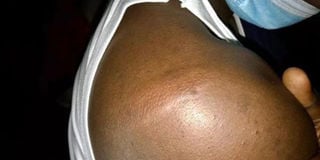Uganda media freedom declining - press report

NTV journalist John Cliff Wamala displays his shoulder where security forces hit him while he was covering election campaigns in Lira
What you need to know:
- The report indicates a fragile relationship between the State and the media, which is degrading. It detailed cases of what happened to the media in the face of Covid-19 and during last year’s elections.
Violence meted against journalists in the recent past by mainly the State and its agencies in Uganda is worrying stakeholders and advocates of press freedom.
“Cameras of Journalists are broken, they are beaten up and there is no clear reason as to why they are being beaten. Yet somebody had indicted clearly that they are journalists and they are doing their job,” Mr Daniel Walyemera, the Dean Faculty of Law at Cavendish University, said on Tuesday.
Mr Walyemera was speaking during a virtual dialogue on the findings of the 2020 Press Freedom Index report released last month by Human Rights Network for Journalists Uganda.
The report indicates a fragile relationship between the State and the media, which is degrading. It detailed cases of what happened to the media in the face of Covid-19 and during last year’s elections.
Ms Ruth Ssenkindi, the director of monitoring and inspection at the Uganda Human Rights Commission, said there is need for the State and stakeholders to understand the work journalists perform in the development of a democratic State.
“Access to public information is so hard because many times they [State agents] feel it is classified but we have an Information Act. Unfortunately, it is not implemented.
“The State also has an obligation to protect media practitioners from any violations. You have heard of some politicians being blocked from accessing a particular radio station because a call has come in from some particular individual,” Ms Ssenkindi explained.
He said the State and any other aggrieved party [on the work journalists do] should bear in mind that journalists only get content from their sources.
“Do not shoot the messenger. Because many times the media is just reporting what is out there. We have also noted that there is a lot of self-censorship. Many times, you do not get the real story. There is political censorship, insecurity censorship, and moral censorship based in religion,” Ms Ssenkindi addead.
Mr Joseph Beyanga, the secretary of National Association of Broadcasters, an umbrella body for broadcasters in Uganda, said the absence of a communications tribunal as stipulated by the Uganda Communications Act, 2013, makes it difficult for journalists to operate.
“One of the big issues which we kept pushing for is the constitution of the communications tribunal. Since 2013 up to now, nothing has happened. When you talk to people who are supposed to be providing for it, they tell you the Judicial Service Commission is supposed to make recommendations to the President then the President makes appointments. But year after year for the last 13 years, we have been pushing for that but nothing is in place,” Mr Beyanga said.
He notes that there are many informal structures and commands that make negotiations for press freedom a challenge.
“We had an engagement with the UPDF after the former CDF (Chief of Defence Forces) came out to apologise after several incidents [of violence against journalists]. We tried to have a working relationship, however, maybe there is another line where the instructions come from within the UPDF. You will also engage with the UPDF but some of the crimes are committed by the SFC (Special Forces Command),” Mr Beyanga said.
The report recommends that Uganda Human Rights Commission shoud: “Investigate all cases relating to violations of press freedoms, especially those committed by the State and its agents. As part of this initiative, appropriate compensation should be provided to victims in deserving cases.’’
Ms Ssenkindi said the State has an obligation to make government information available to the public for scrutiny.



